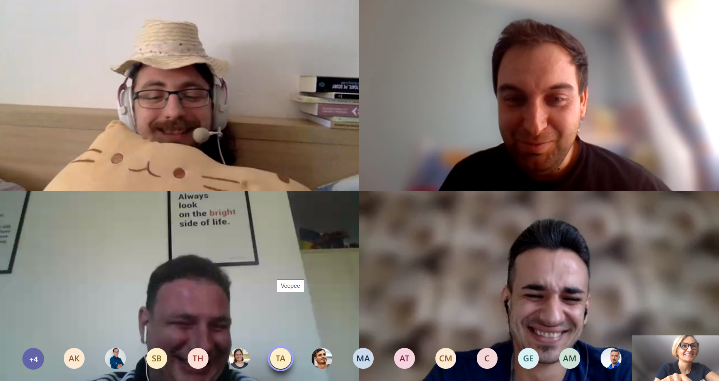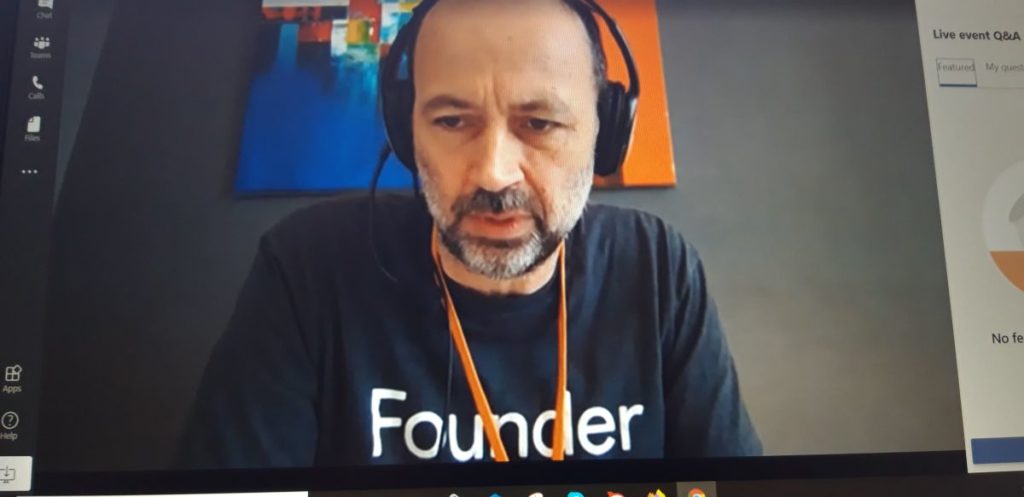In the fight against the COVID-19 pandemic, the current focus in countries around the world is containing and mitigating the disease. For businesses such as Pentalog, the focus is also on implementing a Business Continuity Plan to mitigate risk.
While Pentalog was able to quickly adapt and remain operational, the journey is by no means over.
As we read every day in the news, the economic impacts are significant, and companies are struggling to understand and react to the rapidly unfolding events. A complete understanding of the crisis won’t be available for some time.
When threats become reality, companies like Pentalog use a Business Continuity Plan to adapt to the emerging crisis and adjust in real time to minimize losses to the organization and to its people.

Our employees stay safe, at home, while doing their best work ever, on remote mode.
Still, even though Pentalog anticipated the crisis and made smart preparations, the ongoing race to adapt is fierce. The difficulties are especially pronounced when trying to keep together employees, clients, and projects.
The measures Pentalog implemented follow general rules for mitigating business risks and support a well-defined hierarchy of response escalation in risk and security management. This guidance is as follows:
-
Perform regular reality checks to identify risks and appropriate responses.
-
Ensure transparent communication with employees and stakeholders.
-
Demonstrate and practice solidarity and compassion at all levels.
When we were at Level 1 Alert (Watch – Practice Usual Precautions), we took measures to ensure the safety and well-being of our employees:
Remote work
-
Provided remote work options for employees at all Pentalog locations but kept our agencies open.
At the office
-
For employees that couldn’t work from home, at first, we organized offices to keep them as far away from one another as possible to reduce the risk of local infection.
-
Restricted the number of on-site visitors.
-
Recommended video-conference meetings.
-
Suspended all on-site interviews and other in-person recruitment activities. We continue to do remote assessments.
-
All offices have been equipped with alcohol-based hand sanitizing gel.
We made general recommendations on our internal communication channels in order to:
-
Avoid public transport at peak times.
-
Evaluate personal travel plans.
-
Maintain a good hygiene.
Travel
-
Imposed a 14-day self-isolation period for employees who travelled internationally.
-
Then, we restricted all international business travel.
Events
-
Suspended all Pentalog hosted events involving external attendees.
-
Restricted all our employees from attending any external events.
Work from Home Deployment Plan
When we reached Level 2 Alert (Practice Enhanced Precautions), we moved very quickly (a matter of days) to shift more than 1,100 team members to work from home mode, while maintaining team commitments and productivity for our clients.
How we did it? Managers tested the remote collaboration before telecommuting became mandatory: our infrastructure team made intensive preparations, development teams drilled for such a scenario and employees were given enhanced instruction in digital security practices.
Pentalog’s crisis management group spent two months preparing a work from home deployment plan. Thanks to our agile mindset, time-tested collaboration framework, and robust workflow management tools, we managed the shift very well and mitigate business risks. Our productivity indicators remain stable, even higher in some cases.
Our WFH staggered strategy allowed us to assess and consolidate the IT infrastructure in order to handle traffic spikes we had never seen before.
As my colleague, Daiana, describes in this article her work from home experience, we all made efforts to adjust to the telecommuting mood according to the Business Continuity Plan, staying productive and close to one another with the help of all sorts of organizational communication tools.
Crisis Communication During COVID-19
As we gathered information from reliable sources and analyzed the risks, we kept our employees and clients updated with the best information at our fingertips.
The B2B audience had access to:
-
Our procedures & best practices for client collaboration
-
Our internal memo to inform employees about the safety precautions we have introduced
-
Our Work from home guidelines
-
COVID-19 Information: Symptoms, Preventive Actions, and official news sources
Drawing insights from across the organization, we published work from home guidelines and worked quickly to solve issues reported by our colleagues who were already working remotely. All the while, we maintained all channel communication opened.
At the same time, Pentalog made a big decision to experiment with a cloud-based collaboration platform, and Microsoft Teams became our main tool for communication and exchange.

Microsoft Teams is the daily meeting space both for projects and for our new social life adapted to the current context.
Once all of our 1,100 employees (across on three continents) were transferred to work from home, Fred Lasnier, Pentalog’s CEO, hosted an online meeting to share his thoughts about the crisis, business risks, and rally the teams for the new journey ahead.

Shortly thereafter, we launched PentaLive, a regular talk show broadcast on Facebook, YouTube, and LinkedIn. We started with a French-language version at the end of March and then with the English one. The format includes expert perspectives and legit dialogue on a whole range of subjects from agility, decision-making in times of crisis, and the benefits of outsourcing to telecommuting and IT security strategy. The French online sessions are live every Tuesday and Thursday, at 5 p.m. FR time (6 p.m. RO time and 11 a.m. EST time), while the English sessions take place every Wednesday, at 7 p.m. FR time (8 p.m. RO time and 1 p.m. EST time).
And last but not least, for employees who have children, our PentaKids program was updated with a series of online meetings, dedicated to learning or perfecting languages (English, French and German), animated by our colleagues. Classes give parents a helping hand by offering diverse activities for kids during the day.
Business Continuity Plan … in Progress
The COVID-19 crisis continues globally and will continue to challenge all of us for the foreseeable future. As a member of the global business community, with operations in eight countries, we understand the stress and strain of the current situation. In this uncertain period, we are committed to doing our best:
-
To maintain a safe and healthy work environment for our employees.
-
To continue the delivery of high-quality software products for our clients.
-
To provide expertise and other supports to help clients handle the crisis.
Pentalog is prepared to move to the next level as needed, as part of our Business Continuity Plan, depending on the evolution of the situation. Our highest priority remains support each other, aiming to reduce the consequences of this difficult period to the lowest possible level.
Our advice to our team is simple: stay home, take care of your families, and keep in touch for further information.
Also read:









